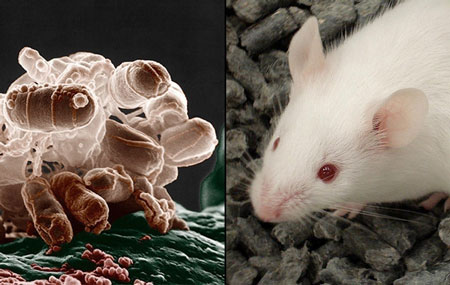Detecting intestinal bacteria helps to lose weight
Animal studies found that intestinal bacteria can be used to treat obesity and type 2 diabetes.
The results of the studies have shown differences in types as well as the number of bacteria in the intestines of fat and thin animals.
According to research published in the Proceedings of the National Academy of Sciences , scientists from the Louvain Catholic University in Belgium have experimented with Akkermansia muciniphila. This bacterium usually accounts for 3 to 5% of the total bacteria in the intestinal tract, but the number will decrease in obese hosts.
The team mixed Akkermansia bacteria muciniphila into the diets of high-fat diets, which made them twice or three times as fat as normal and lean mice.

The experiment showed that mixing Akkermansia bacteria muciniphila into food helped fat mice reduce fat and become "slimmer" . (Photo: geekosystem.com)
The mice in the experiment were still bigger than other normal species, but lost nearly half of the excess weight compared to the original, although there were no further changes to their diet. . These rats also had lower levels of insulin resistance - a key marker of type 2 diabetes.
Professor Patrice Cani, a member of the research team, stated: "Of course, this is just an improvement and we still cannot completely reverse obesity. However, the experiment has greatly reduced This is the first illustration of a direct link between a certain species of microorganism and the metabolic improvement ".
Adding bacteria has increased the thickness of the intestinal mucus barrier, which helps prevent certain substances from passing through the intestine into the blood. This also changes chemical signals from the digestive system, leading to changes in the way fats are processed elsewhere in the body.
Similar results were obtained when researchers added a fiber to the animal's diet, leading to an increase in the number of Akkermansia bacteria muciniphila in the intestine of the subject.
Professor Cani said, the surprising thing is that only one species in the thousands of intestinal microorganisms can produce such amazing effects. The researcher said the finding is the first step towards a prospective "use of bacteria to prevent or treat obesity and type 2 diabetes". He is optimistic that some form of bacterial-based therapy will be used "in the near future".
Now researchers need to conduct more similar experiments in humans to see if Akkermansia muciniphila helps us lose weight.
As we know, the human body is a place that contains countless bacteria. The total number of tiny microorganisms resides or parasites in the human body even more than 10 times the human own cells. There is growing evidence that this collection of bacteria greatly affects our health.
- This intestinal bacteria can cause you to lose weight
- 'Hack' intestinal bacteria of cows can bring more meat and reduce pollution
- Lose weight ... avatar
- Detecting hormones helps obese people lose weight
- Women who are kissed regularly can lose weight faster
- A lot of water lunch helps lose weight
- The waste of skinny people can be used to prepare obesity medicines
- This seemingly harmless bacterium killed one third of the world's population
- 5 health things related to your blood type
- Fatty - Errors in bacteria
- Special invention helps impressive weight loss
- Climate change creates many intestinal bacteria
 Why do potatoes have eyes?
Why do potatoes have eyes? 'Tragedy' the world's largest carnivorous life: Death becomes ... public toilet
'Tragedy' the world's largest carnivorous life: Death becomes ... public toilet Tomatoes were once considered 'poisonous' for 200 years
Tomatoes were once considered 'poisonous' for 200 years Detecting microscopic parasites on human face
Detecting microscopic parasites on human face The hidden fuel of the human brain: How gut bacteria shape intelligence?
The hidden fuel of the human brain: How gut bacteria shape intelligence?  New bacteria appear in unexpected places
New bacteria appear in unexpected places  3,600-year-old cheese 'reveals' secrets of ancient food preparation
3,600-year-old cheese 'reveals' secrets of ancient food preparation  Spanish mother and daughter experts 'train' bacteria to restore paintings
Spanish mother and daughter experts 'train' bacteria to restore paintings  NASA is worried about mutant bacteria in the Space Station spreading to Earth
NASA is worried about mutant bacteria in the Space Station spreading to Earth  Identifying the deadly link between oral bacteria and cancer
Identifying the deadly link between oral bacteria and cancer 